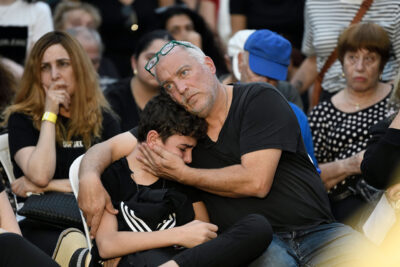This article was originally published in the Jewish Journal by Dr. Noam Weissman and Sara Himeles. Reprinted with permission.
After listening to Seth Rogen discuss Israel and Judaism in his interview on Marc Maron’s “WTF” podcast, we spent the first two days reading the somewhat predictable responses. From the right, some called Rogen self-hating, ignorant and uneducated. From the extreme left, he was lauded as a new Jewish hero.
One of us grew up Modern Orthodox, attended a Jewish day school and spent years in yeshiva. The other grew up Reform, did not attend Jewish day school and now is pursuing Conservative rabbinic ordination. Notwithstanding those differences, we both reacted to Rogen’s podcast the same way.
Our visceral first reaction was sadness. When Rogen said, “As a Jewish person I was fed a ton of lies about Israel my entire life,” that “they forgot to include the facts” in his Israel education, and having a Jewish state “makes no sense,” we felt sad that this described his experience of Jewish education, and that he views the state of Israel the way he does. We thought of the many young Jewish people who look up to Rogen as a role model, imagining how hearing these words from him may have impacted their attitudes toward both the state of Israel and their own Judaism.
From “Superbad” and “Pineapple Express” to “Neighbors” and “An American Pickle,” Rogen always has worn his Jewishness on his sleeve. While he is hilarious and witty, perhaps his most distinctive feature for many of us is his Jewishness. More than just a facade, his Jewish identity was forged during his time at a Jewish day school and summer camp.
We wondered: How could it be that someone who expresses his Jewish identity on the outside and has developed it on the inside would end up feeling this way about Judaism and Israel? Why is it that many Jews who attend day school and summer camp emerge proud of their Judaism, confident in their stories and ready to pursue a life-long relationship with Judaism, while others feel their experience was “silly” and they were “brainwashed”?
Some have dismissed Rogen’s comments altogether, arguing he does not have the right to speak about Judaism or the Jewish state because he is “just a comedian.” This reminds us of when Fox News’ Laura Ingraham told LeBron James to “shut up and dribble.” The reality is that celebrities do use their platforms to speak about pressing social issues. If we’re honest with ourselves, we often applaud their willingness to take stances when they evangelize the ideas we believe in, and we become elitist (“Shut up and dribble”) when they spout ideas at odds with our opinions.
Either way, Rogen is not just an A-list celebrity with a platform and a captive audience. He also is the product of a Jewish education. And with regard to how young Jewish people are taught about Israel, this surely cannot be the first time we’ve heard this kind of assessment. Five years ago, a video about Jewish day school students feeling like they were duped made the rounds. The interviewees reported they were fed talking points and told not to debate, and that they graduated from their programs “not knowing enough.”
From his interview, we can tell Rogen had this kind of experience and his education about Judaism and Israel had significant gaps. Rogen criticized the Israel education he received as a child for ignoring Palestinian history, saying he was “fed a huge amount of lies about Israel my entire life. You know, they never tell you that ‘Oh, by the way, there were people there.’ ”
This is puzzling. The fact that after spending time at both a Jewish school and summer camp, Rogen — and we’ll take him at his word — did not know there were Palestinian Arabs already living in Israel (then called Palestine) before the state of Israel was created, indicates the material he was presented was more than just biased: It highlighted certain perspectives while excluding others. There were hundreds of thousands of Palestinian Arabs in the region in the late 19th and early 20th centuries. Why was this fact glossed over? Acknowledging this reality does not discredit the Jewish yearning to return home, the continuous Jewish presence in the land for millennia, the objectives of Zionism, or the achievements of the young and only Jewish state.
Rogen’s education about Judaism seems to have had just as many gaps. As Jewish educators, we were happy to hear Rogen resonates with Judaism’s “protocol” when it comes to death and mourning, but what about all the other rituals?
Part of the beauty and grandeur of the Jewish tradition — and one reason why it has endured for thousands of years − is that Judaism has “protocols” that help people meet challenges and thrive in every aspect of our lives. Judaism has a protocol in the form of Shabbat that tells you how to structure your week and how to allocate your time and energy. It has a protocol in the form of the Jewish calendar of designating times for joy, sadness, reflection, storytelling, community and family, imagining the future and remembering our past. And most important of all, it has a protocol for how we ought to regard one another, ourselves and the world we inhabit.
Our conclusion is that Rogen learned some parts of the Israel story and has experienced some aspects of Jewish life, but that his Jewish and Israel education was very incomplete. This showed during his interview. At times, Rogen seemed like a prototype of someone who sees Judaism and Israel only from the perspective of the Hollywood Hills. He seemed unaware of the lived experiences of Jews in Addis Ababa, Kiev, St. Petersburg or Baghdad, for whom the State of Israel is a safe haven. These Jewish people were accepted by Israel like no other country — not because they were amazing baseball players, MIT-trained astrophysicists or won a lottery, but simply because they belong to this small and ancient nation.
So, how will the Jewish educational world and the entire Jewish community respond? Will we react impulsively, lamenting Rogen as a lost cause, another product of narcissistic Western self-indulgence? Will we blame him and call him a self-hating Jew? Or will we choose to look inward, hold ourselves accountable and ask, “What can we, as educators and as a Jewish community, do differently?”
To answer that question, we are guided by Vayikra 19:17-18, where the verse states: “Do not hate your brother in your heart … . You shall love your neighbor as yourself.” First, Rogen is anything but self-hating. He made a promotional video for his Jewish summer camp, married a Jewish woman and frequently discusses his Judaism. It would behoove each of us to stop policing Jewish self-hatred.
Second, it is time for the Jewish community to put this simple injunction into practice in terms of the way we regard both Rogen and one another. Until we resolve to reduce our divisions and disagreements, and to be guided by empathy and mutual understanding, each new controversy only further divides us along the lines of left versus right, religious versus secular and Israeli versus Diaspora.
Beginning with Rogen, let’s resolve to try a different approach. Rather than accusing Rogen and other Jews who view Israel and Judaism the way he does of having “privilege,” being ignorant or somehow wanting to cause harm to the Jewish people, let’s invite them to have a conversation. The goal of these meetings would be to hear where each side is coming from, learn together and come away with a new understanding. Having this discussion over a shared meal or a Shabbat dinner in one’s home is even better. We believe every Jewish person has a powerful role to play in bridging the divisions that fracture our community.
In our classrooms, let’s make sure our Israel content is nuanced and presents multiple sides of issues. It’s time for a Mikraot Gedolot approach to Israel education. What do we mean by this? Pick up one of these books and flip to any page. You will see a few lines from the Torah; the remaining 90 percent of the page is filled with debate and discussion about what these lines mean.
The great medieval scholars Rashi, Rashbam, Ibn Ezra and Ramban occupy the pages. With their fierce disagreements about the chronology, historicity and meaning of the text, these “Rishonim” teach us that debate is not meant just to be accepted or tolerated in Jewish learning, but that in fact, this kind of spirited exchange of ideas − as long as it comes from a place of love and reverence of the text − is the essence and ideal of Jewish learning.
Let’s use the example set by these great Jewish thinkers to guide the way we teach our students about Israel. Rather than imply there is only one right way to think, let’s present multiple perspectives on Zionism, Israeli history and current events. Let’s let our young people debate and dialogue − not just defend − with the same caveat we apply to Torah education. Specifically, there ought to be a deep respect for the existence of the State of Israel. And in the spirit of our tradition, different opinions should be welcome, as long as they are offered in a spirit of good faith and generosity, and with evidence to back up the claim. Within that framework, let the debates ensue.
As we work to enhance the quality of our Israel education, let’s also recognize that the answer to fostering healthy Jewish identities in our students is not only about exposing them to the State of Israel. If we want our students to develop lasting Jewish identities, we need to make sure they understand the beauty and wisdom of their own Judaism. This means that as educators, we have a responsibility to provide high-quality educational experiences not only about Israel, but also Jewish tradition and scripture, peoplehood, philosophy, history, leadership and culture. Ensuring our young people receive a full package of quality Israel and Jewish education − not only one or two areas at the expense of all the rest − is the best way to help them develop Jewish identities that have depth.
Creative innovative educator A.J. Juliani said it best: “Our job as teachers is not to prepare our students for something; our job is to help kids learn to prepare for anything.” While schools, synagogues, youth groups and camps still are primary places of Jewish learning, perhaps other platforms with captive audiences, such as YouTube, are the next frontier to ensure the next generation of Jews is “prepared for anything.”



